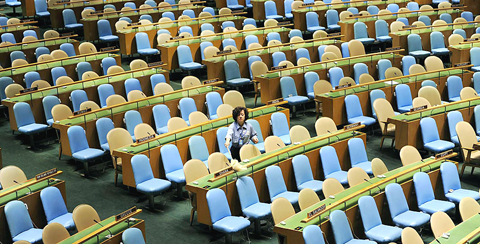British Airways chief executive Willie Walsh was scheduled to tell world leaders at the UN climate summit yesterday that the aviation industry could halve its carbon dioxide emissions by 2050, a spokesman for the airline said on Monday.
The International Air Transport Association (IATA) agreed to the ambitious target to cut sector emissions to 50 percent below 2005 levels by 2050 at its annual general meeting in June.
Britain’s Committee on Climate Change said this month flights could produce up to a fifth of all global carbon dioxide emissions by 2050, from about 2 percent now, without urgent and drastic action.

PHOTO: EPA
IATA says a global carbon emissions permit trading system should be introduced to encourage cuts, rather than slapping more taxes on air travel.
“Carbon trading gives airlines a direct incentive to reduce their emissions. Flight taxes, such as Air Passenger Duty, do not,” British Airways said in a statement. “Taxation guarantees no emissions reductions whatever, and does not necessarily provide any revenue for environmental objectives.”
World leaders were to meet at the UN in New York yesterday for a one-day summit to try to unlock 190-nation negotiations on a new deal to combat global warming due to be hammered out in Copenhagen in December.
IATA also agreed in June to cap carbon emissions from aviation from 2020, and aim for an average improvement in fuel efficiency of 1.5 percent per year from this year to 2020.
Meanwhile, General Electric Co and BP Plc are demanding governments enact regulations to cut emissions blamed for global warming and create a worldwide carbon market to ensure developing nations slow pollution growth.
GE, the biggest maker of power-plant equipment, and BP, Europe’s second-largest oil company, joined other multinational manufacturers and service providers demanding leaders agree to cut emissions 85 percent by 2050. They also want rules to keep developing countries from logging tropical forests and money to help the poor adapt to a warming planet.
Without a global pact, industry will suffer from “uncertainty,” the firms said in a statement that was also signed by Coca-Cola, Starbucks, BASF and Rio Tinto.

MORE VISITORS: The Tourism Administration said that it is seeing positive prospects in its efforts to expand the tourism market in North America and Europe Taiwan has been ranked as the cheapest place in the world to travel to this year, based on a list recommended by NerdWallet. The San Francisco-based personal finance company said that Taiwan topped the list of 16 nations it chose for budget travelers because US tourists do not need visas and travelers can easily have a good meal for less than US$10. A bus ride in Taipei costs just under US$0.50, while subway rides start at US$0.60, the firm said, adding that public transportation in Taiwan is easy to navigate. The firm also called Taiwan a “food lover’s paradise,” citing inexpensive breakfast stalls

TRADE: A mandatory declaration of origin for manufactured goods bound for the US is to take effect on May 7 to block China from exploiting Taiwan’s trade channels All products manufactured in Taiwan and exported to the US must include a signed declaration of origin starting on May 7, the Bureau of Foreign Trade announced yesterday. US President Donald Trump on April 2 imposed a 32 percent tariff on imports from Taiwan, but one week later announced a 90-day pause on its implementation. However, a universal 10 percent tariff was immediately applied to most imports from around the world. On April 12, the Trump administration further exempted computers, smartphones and semiconductors from the new tariffs. In response, President William Lai’s (賴清德) administration has introduced a series of countermeasures to support affected

CROSS-STRAIT: The vast majority of Taiwanese support maintaining the ‘status quo,’ while concern is rising about Beijing’s influence operations More than eight out of 10 Taiwanese reject Beijing’s “one country, two systems” framework for cross-strait relations, according to a survey released by the Mainland Affairs Council (MAC) on Thursday. The MAC’s latest quarterly survey found that 84.4 percent of respondents opposed Beijing’s “one country, two systems” formula for handling cross-strait relations — a figure consistent with past polling. Over the past three years, opposition to the framework has remained high, ranging from a low of 83.6 percent in April 2023 to a peak of 89.6 percent in April last year. In the most recent poll, 82.5 percent also rejected China’s

PLUGGING HOLES: The amendments would bring the legislation in line with systems found in other countries such as Japan and the US, Legislator Chen Kuan-ting said Democratic Progressive Party (DPP) Legislator Chen Kuan-ting (陳冠廷) has proposed amending national security legislation amid a spate of espionage cases. Potential gaps in security vetting procedures for personnel with access to sensitive information prompted him to propose the amendments, which would introduce changes to Article 14 of the Classified National Security Information Protection Act (國家機密保護法), Chen said yesterday. The proposal, which aims to enhance interagency vetting procedures and reduce the risk of classified information leaks, would establish a comprehensive security clearance system in Taiwan, he said. The amendment would require character and loyalty checks for civil servants and intelligence personnel prior to